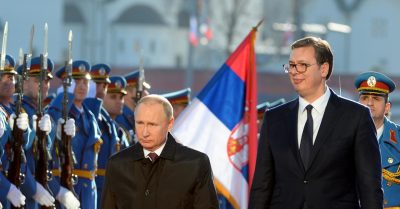Washington Ponders Imposing Sanctions on Serbia for Russian Weapon Purchases

With Russia delivering another round of the Pantsir S1 anti-missile defense system to Serbia on Tuesday, EU and U.S. officials have reacted. Both Brussels and Washington have sent their warnings to Serbia, with Washington even threatening sanctions against the Balkans country. For the U.S., they are hoping to prevent Serbia from acquiring the Russian made S-400 missile defense system as it will severely restrict American hegemony over the Balkans. While Brussels expects Serbia to comply with the commitments it made when it entered the EU’s strategic priority, the U.S. State Department urged countries to abandon purchases from Russia as it could lead to sanctions.
“In discussions with senior government officials, we have repeatedly expressed concern that Serbia is buying Russian military equipment, including the purchase of the Pantsir system,” a State Department spokesman said.
The European Union previously said that in order to progress on the road to European integration, “Serbia needs to align its foreign policy with the EU’s foreign policy, in accordance with the negotiating framework.” Although Brussels is not making threats of sanctions against Serbia, it is leveraging a potential Serbian admission into the EU. This leverage would not be effective however as only 42% of people in Serbia are in favour of EU membership.
However, this is not the first time that U.S. administration officials are threatening to activate Section 231 of the Countering America’s Adversaries Through Sanctions Act of 2017, which deals with the possibility of imposing sanctions on individuals and legal entities having business cooperation with the security and intelligence sectors of Russia, Iran and North Korea. In November last year, Thomas Zarzecki, director of the U.S. State Department’s Task Force 231, arrived in Belgrade immediately after it was announced that Serbia had purchased the Pantsir system. Even before the arrival Zarzecki, it was announced by Matthew Palmer, U.S. Secretary of State’s representative for the Balkans, that sanctions may be imposed against Serbia.
Zarzecki left Belgrade last November and no sanctions were imposed on Serbia. Now, after Serbia acquired the Pantsir and they have begun arriving in the country, the possibility of imposing U.S. sanctions is being activated again. This becomes difficult as there is no doubt that the State Department will be pushing to punish Serbia for acquiring Russian weaponry. However, it is still within easy living memory that the U.S. led a NATO campaign of destruction against Serbia in 1999, killing over 500 civilians and destroying vital civilian infrastructure like bridges, industrial plants and private businesses. This campaign of destruction has left widespread anti-American sentiment that still persists to this day. Paradoxically, most NATO members today, with the exception of the U.S., has a more positive attitude towards Serbia and would accept that the purchase of military equipment from Russia is a national decision of Serbia and that Belgrade is entitled to that decision.
The President of the Foreign Policy Committee of the House of Representatives of the U.S. Congress, Eliot Engel, publicly rebuked one of the U.S. generals serving in NATO over the Alliance’s stance on Serbia. Engel criticized the position on Serbia’s military neutrality and intensive cooperation with Russia. As the Pantsir system is arriving in Serbia, interests for the S-400 system will intensify. Other states have received threats of sanctions if they purchase the S-400, such as India, and it can only be expected that Serbia will receive such warnings, too. Therefore, these discussions of sanctions because of the Pantsir system is a preventative warning for Serbia not to purchase the S-400.
However, the Serbia of the 1990’s is drastically different to the Serbia of today. Today, Serbia is making a recovery from the 1990’s and both Russia and China have achieved Great Power status and are willing to oppose Western interventionism and support independent states such as Serbia.
The U.S. State Department’s position certainly has elements of dissatisfaction over Serbia’s co-operation with Russia and China. NATO, on the other hand, praises the level of co-operation with Serbia and is ready, at least in words, to respect military neutrality. With the 1990’s remembered for the collapse of the Soviet Union and the advent of the U.S. dominated unipolar world, things have changed so much in the world that a once weak Russia and China who were, now are capable of maintaining their own positions.
With Russian and Chinese support, Serbia has enough strength to resist U.S.-led pressures that imposed sanctions could have minimal impact on the country, and rather create opportunities to push towards financial independence away from the U.S. dollar. It is for this reason that even Washington will be contemplating whether imposing such sanctions would be worth the risk of pushing another country towards financial independence as has happened in Iran and Venezuela.
*
Note to readers: please click the share buttons above or below. Forward this article to your email lists. Crosspost on your blog site, internet forums. etc.
This article was originally published on InfoBrics.
Paul Antonopoulos is a Research Fellow at the Center for Syncretic Studies.

